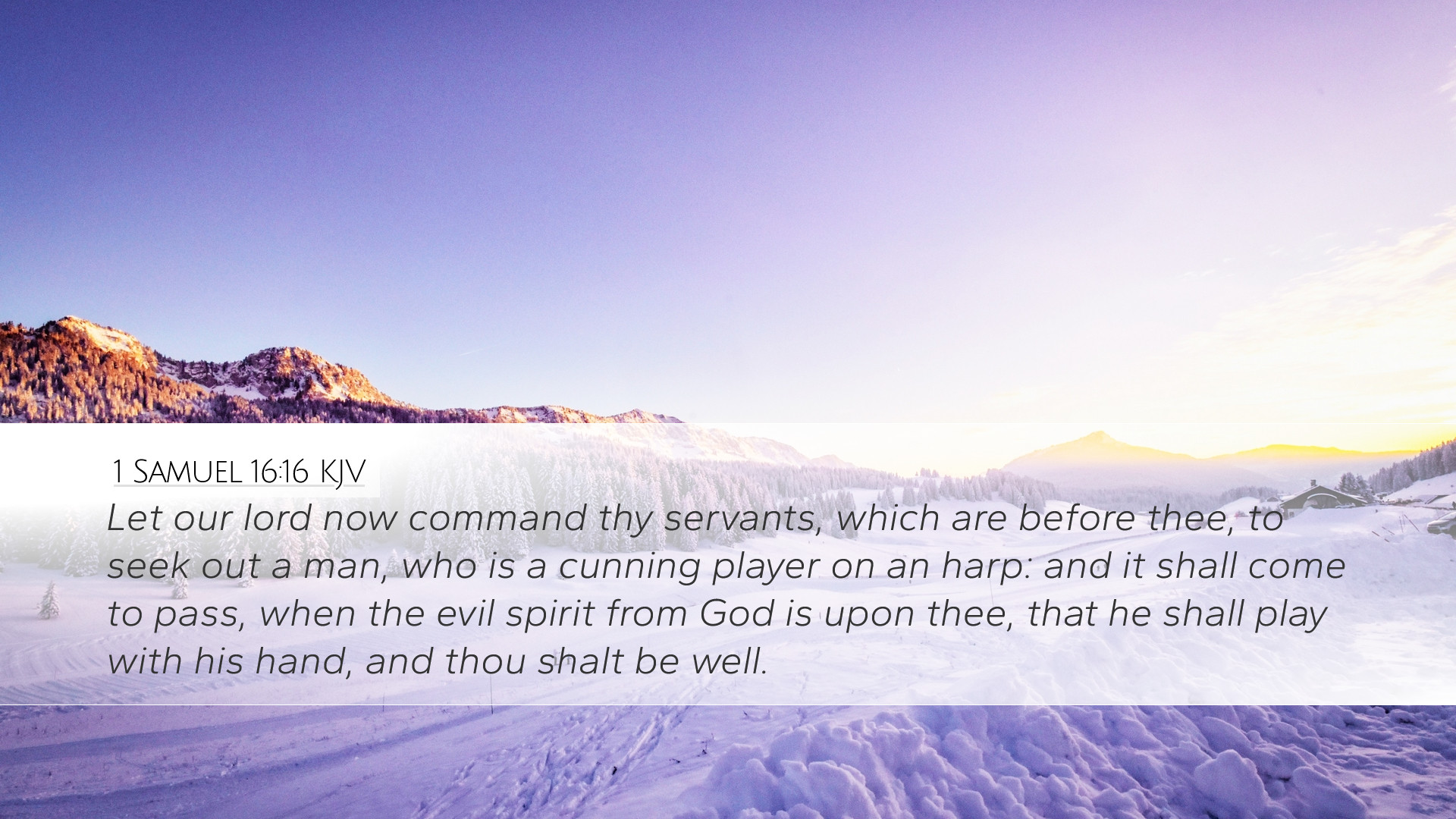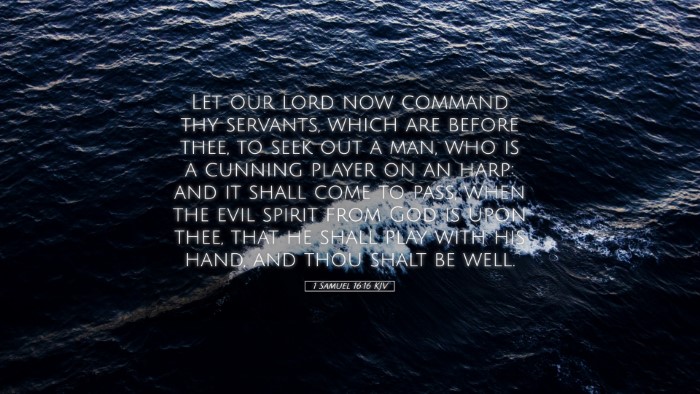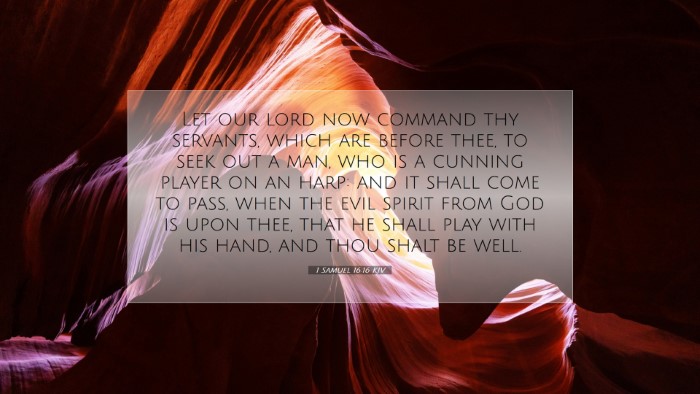Commentary on 1 Samuel 16:16
Verse Context: 1 Samuel 16:16 (KJV) states, "Let our lord now command thy servants, which are before thee, to seek out a man, who is a cunning player on an harp: and it shall come to pass, when the evil spirit from God is upon thee, that he shall play with his hand, and thou shalt be well." This verse occurs during a pivotal moment in the history of Israel, highlighting the transition of leadership from Saul to David.
Introduction
This commentary seeks to reflect on the profound implications of 1 Samuel 16:16. It specifically addresses the actions prompted by the anointing of David, and God’s sovereign intervention in selecting a king after His own heart. The insights drawn from Matthew Henry, Albert Barnes, and Adam Clarke provide a rich tapestry of theological reflections that are pertinent for pastors, students, and theologians alike.
Overview and Significance of the Verse
This verse illustrates the dire straits of King Saul, who was plagued by an evil spirit sent by God. The request to find a skilled harpist emphasizes the need for divine intervention in the form of music to alleviate Saul’s torment. This selection of a musician suggests deeper themes of the relationship between worship, music, and spirituality.
Theological Implications
- The Nature of God’s Sovereignty: The reference to an “evil spirit from God” opens a significant discussion on God’s sovereignty. Barnes notes that God at times permits or sends distressing spirits for a divine purpose, reminding us that God is in control even amidst chaos.
- Music as a Divine Tool: The chosen harpist symbolizes how instrumental music can serve as a vehicle for God’s peace. Clarke emphasizes that music has a unique ability to soften hearts and quell tensions, illustrating God's grace in the midst of suffering.
- God’s Provision in Crisis: The suggestion to find a “cunning player” denotes the providence of God. Henry remarks that God raises men for specific tasks during critical times, showcasing His intimate involvement in the lives of His people.
Insights from Public Domain Commentaries
Matthew Henry's Commentary
According to Matthew Henry, this verse indicates that the distress which King Saul experienced was not merely a psychological issue, but rather a spiritual one. The evil spirit left Saul in a state of torment, making him unfit for leadership. Henry underscores that Saul was in a position of great need, implying that not all who lead are free from spiritual afflictions.
Henry also emphasizes the role of music in ministry, noting that the right music can have soothing effects on the soul. The harp played by David would not just entertain but serve as a means of healing, echoing the importance of worship in the life of a believer. This highlights that God can use simple, everyday acts—like playing an instrument—as means of His greater purpose.
Albert Barnes' Commentary
Albert Barnes elaborates on the concept that the evil spirit signified God's withdrawal from Saul due to his disobedience. Barnes underscores that the request from Saul's servants to find a musician indicates a practical response to spiritual malaise. It suggests wisdom in seeking healing through prayer and worship. Music, in this case, becomes an instrument that heralds divine influence and intervention.
Moreover, Barnes suggests that this incident sets the stage for David’s rise to power in a way that is both providential and purposeful. The harpist is to become a significant figure not only in soothing King Saul but also in redefining kingship in Israel, thus linking back to the theme of divine selection and human frailty.
Adam Clarke's Commentary
Adam Clarke offers noteworthy observations regarding the societal implications of this verse. He notes that the selection of a musician for the king’s distress reflects a dependent relationship between leadership and the arts. Clarke’s perspective underscores the validity of emotional expression—through music—as a necessary part of leadership and governance.
Clarke concludes that David's playing would serve as a stronger testament of his future role as king, framing David's character not merely as a shepherd but also as a man of emotional and spiritual depth capable of influencing those around him. This paints a larger theological image of how God prepares His chosen leaders through diverse means.
Conclusion
1 Samuel 16:16 stands as a powerful reminder of God’s providence and the multifaceted nature of His governance. The verse encapsulates a critical transitional moment in biblical history marked by divine intervention, spiritual warfare, and the integral role of worship in overcoming personal and national crises.
For modern readers and scholars, the reflections provided by Henry, Barnes, and Clarke offer a depth of understanding that encourages spiritual sensitivity to both the struggles of leadership and the power of music in worship. This text serves as an invitation to reflect on the relationships among God’s sovereignty, human frailty, and the arts, urging us to seek divine solutions in moments of distress.


